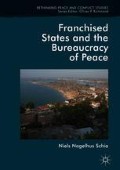Abstract
This book empirically scrutinizes paradoxes of peacebuilding by showing how the Liberian state was being rebuilt as a global phenomenon through peacebuilding. With regard to the anthropological perspectives on organization and sovereignty, it was possible to see Liberia as a franchised state and thereby argue that even if the ideology behind peacebuilding is built on Western values and ideas, it is not necessarily Western goggles that determine how peacebuilding, and the organizations through which it is implemented, is sub-situated. That is determined by how institutions are built and filled with purpose and content through human practices.
At the aggregate level, it is not inconceivable that states like Liberia could represent a relatively new kind of state formation where the status of the national-state yields terrain to new types of state formations that exist in a combination of state-like agencies such as NGOs, corporations, and international organizations or as franchised states. The book shows how global processes like peacebuilding may challenge our conception of states, causing new kinds of state formations and making it necessary to revisit questions concerning sovereignty.
References
Alonso, Ana M. 2005. Sovereignty, the Spatial Politics of Security, and Gender: Looking North and South from the US–Mexico Border. In State Formation: Anthropological Perspectives, ed. C. Krohn-Hansen and K. Nustad, 27–55. London: Pluto.
Bartelson, Jens. 2014. Sovereignty as Symbolic Form. New York: Routledge.
Douglas, Mary. 1986. How Institutions Think. Syracuse, NY: Syracuse University Press.
Ong, Aihwa. 2000. Graduated Sovereignty in South-East Asia. Theory Culture Society 17 (4): 55–75.
———. 2008. Ecologies of Expertise: Assembling Flows, Managing Citizenship. In Global Assemblages: Technology, Politics, and Ethics as Anthropological Problems, ed. A. Ong and S.J. Collier. Oxford: Blackwell.
Robertson, Roland. 1995. Glocalization: Time–Space and Homogeneity–Heterogeneity. In Global Modernities, ed. Mike Featherstone, Scott M. Lash, and Roland Robertson, 25–45. London: Sage.
Tsing, Anna Lowenhaupt. 2005. Friction: An Ethnography of Global Connection. Princeton, NJ: Princeton University Press.
Author information
Authors and Affiliations
Rights and permissions
Copyright information
© 2018 The Author(s)
About this chapter
Cite this chapter
Schia, N.N. (2018). Franchised States and Beyond. In: Franchised States and the Bureaucracy of Peace. Rethinking Peace and Conflict Studies. Palgrave Macmillan, Cham. https://doi.org/10.1007/978-3-319-65569-7_10
Download citation
DOI: https://doi.org/10.1007/978-3-319-65569-7_10
Published:
Publisher Name: Palgrave Macmillan, Cham
Print ISBN: 978-3-319-65568-0
Online ISBN: 978-3-319-65569-7
eBook Packages: Political Science and International StudiesPolitical Science and International Studies (R0)

